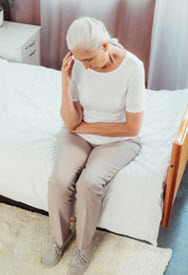These incidents are very common at most long-term care facilities in the Sunshine State. About 60 percent of nursing home residents fall each year. Because of the exploding senior population, many of these facilities are almost constantly under construction to accommodate more patients. Often due to age or medication, many residents are not fully aware of their surroundings. So, a “Keep Out” or “Under Construction” sign may not have the desired effect.
Compensation in a nursing home fall case usually includes money for both economic damages, like medical bills, and noneconomic damages, like pain and suffering.
Legal Duty in a Florida Slip-and-Fall Case
To determine if the nursing home owner has any responsibility in the matter, the first step is to ascertain the victim/plaintiff’s status.
Most people in nursing homes are invitees. These individuals confer a benefit on the landowner simply because of their presence at the facility. Nursing home residents are business invitees because they give the landowner money. People who visit nursing home residents might be invitees as well. Even though no money changes hands, they make the residents happier. However, the benefit to the owner is only indirect.
If the victim was an invitee, a Florida landowner has a duty of reasonable care. That duty includes making the premises reasonably safe. That duty also includes frequent safety inspections. There is not one blanket “duty of care.” The effort needed to make senior citizens reasonably safe outstrips that needed for younger people. The higher duty applies in Florida nursing home cases.
Knowledge in a Florida Slip-and-Fall Case
To obtain compensation, the victim/plaintiff must prove that the landowner knew about the dangerous condition which caused the fall.
Sometimes, there is direct evidence of knowledge. Such evidence usually appears during the discovery process. One example is a deposition question. If an attorney asks an owner if s/he knew about the defect, the owner must answer truthfully under oath. Other times, there is a “smoking gun” memo or repair invoice.
Most of the time, however, the victim/plaintiff must use circumstantial evidence. Florida basically uses a variation of the time/notice rule. If the hazard existed for a long time, the owner should have known about it. This concept is called constructive knowledge. For negligence purposes, constructive knowledge is just as good as actual knowledge.
The Eggshell Skull Rule in Florida
As mentioned earlier, many nursing home residents are physically frail. So, they are highly vulnerable to serious injury. In fact, a minor fall that might not affect a younger adult can be almost debilitating for a senior citizen.
In cases like these, the Florida defendant is responsible for the full measure of damages. If the victim/plaintiff had a pre-existing condition, like an eggshell skull or a prior injury, the defendant cannot avoid liability.
The victim/plaintiff must establish the amount of damages by a preponderance of the evidence (more likely than not). Usually, that’s done through medical bills.
Reach Out to Dedicated Attorneys
Nursing home falls are alarmingly common, and quite serious, in Florida. For a free consultation with an experienced personal injury lawyer in Brandon, contact Reed & Reed. We have four area offices (St. Petersburg, Lakeland, Tampa, and Clearwater).
Resource:
nfsi.org/nfsi-research/quick-facts/

